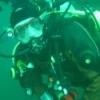
Environmental Pros and Cons of Artificial Reefing
#1

Posted 19 May 2010 - 10:35 AM
I performed a search on the subject here and did not find threads that specifically addressed the environmental pros and cons of reefing in general. The threads I did see were project-specific.
I would greatly appreciate it if SD members would consider this thread an open forum to discuss both the pros and cons from their perspective. It could be very helpful in this effort. TIA.
#2

Posted 19 May 2010 - 10:59 AM
Contact me directly at Kamala@SingleDivers.com for your private or group travel needs or 864-557-6079 AND don't miss SD's 2018-2021 Trips! ....here! Most are once in a lifetime opportunities...don't miss the chance to go!!
SD LEGACY/OLD/MANUAL Forms & Documents.... here !
Click here TO PAY for Merchandise, Membership, or Travel
"Imitation is the sincerest flattery." - Gandhi
"Imitation is proof that originality is rare." - ScubaHawk
SingleDivers.com...often imitated...never duplicated!
Kamala Shadduck c/o SingleDivers.com LLC
2234 North Federal Hwy, #1010 Boca Raton, FL 33431
formerly...
710 Dive Buddy Lane; Salem, SC 29676
864-557-6079 tel/celfone/office or tollfree fax 888-480-0906
#3

Posted 19 May 2010 - 11:41 AM
That being said there needs to be put into place a set of guidelines to ensure that the location is chosen so as not to adversely impact wild life in and around the sink site. The site should also be screened for the impact of additional boat traffic and moored boats on the site.
The consequence of a ship adding hard firm structure to the basic marine life and the huge increases in the amount of life sustained on them is well documented. Anyone who doubts this should come on the SD trip to North Carolina over the 4th of July and see the tremendous amount of life these artificial reefs support.
The economic influence of these artificial reefs is also well documented. Local hotels, restaurants, and Businesses of all types reap long term benefits from scuba diving and fishing tourists.
I donít know what the cost is for the federal government to maintain these ships in mothballs. But it is my opinion that whatever that cost is 5 years of that sum should be put up as upfront money to any organization that wants to take on the task of reefing a ship.
Thatís my 2 psi
Each wreck has a tale to tell about its life and its demise.
If you are observant while diving in dark places listen to the account each has to tell, You cannot come away unaffected.
Changes in Latitude, Changes in Attitude
#4

Posted 20 May 2010 - 11:11 AM
Rick
'When you win, nothing hurts.' -Joe Namath
Edited by Hipshot, 20 May 2010 - 11:16 AM.
#5

Posted 20 May 2010 - 12:29 PM
What happens to the reef elements that have grown on these metal hulks when the structure eventually fails?
#6

Posted 20 May 2010 - 02:57 PM
They sure get covered with a lot of coral pretty quickly in some areas. The Ancient Mariner is only 19 years old and has a zillion fishes and there are few places to grab the wreck because it is getting covered in coral.
Pros....
- adds a lot of variety to your diving.
- You can just grab a hand rail and watch fish go by for your whole dive.
- The dive charter boats will be able to keep prices down since there will be more divers on each trip (on average).
- If you don't like current, settle down in the hold of the ship where there is no current. Sit down and the fish will come to you.
- Dive boat doesn't have to run engines to keep from drifting away (you don't anchor on a 'real reef'), dive boat ties up to the artificial wreck.
- You get to follow the anchor rope down to the wreck. Newer divers really like that.
- You get to follow the anchor rope up to the dive boat. Newer divers really like that.
- Certain sea life is easier to predict. You know where you are very likely to see morays, stingrays, nurse sharks, jewfish. That's harder to predict than a drift dive.
- You do not have to be any good at navigating to find your way back to the charter boat.
Cons....
- Your local dive store will be busier and have less time to sit around and talk.
- The charter boats will have fewer empty seats, you will have to keep all your gear in your one spot.
- Dive boat owners will not get to sleep in as often as there will be more divers.
- "artificial reefs" made from ships are often set quite deep (100 to 140 feet to the sand, compared to 40 feet for a nice natural reef).
"Artificial reef" does not have to be a boat. Look at the Sea Emperor. They 'filled' it with large concrete culvert sections. When the barge sank, it flipped over. The piles of concrete culvert sections is a great home for many animals.
Edited by Racer184, 20 May 2010 - 02:57 PM.
#7

Posted 20 May 2010 - 07:27 PM
"Artificial reef" does not have to be a boat. Look at the Sea Emperor. They 'filled' it with large concrete culvert sections. When the barge sank, it flipped over. The piles of concrete culvert sections is a great home for many animals.
Back in the bad old days, many artificial reefs were made out of old tires that were half-filled with concrete. Unfortunately, these reefs didn't stay together, so they usually ended up as a bunch of individual tires over an area.
Rick
#8

Posted 20 May 2010 - 07:35 PM
Another consideration is that salt water is anathema to metal. Eventually, those metal ships sunk as artificial reefs will disintegrate, and/or collapse. Hopefully, there are no divers penetrating wrecks that are becoming unstable!
What happens to the reef elements that have grown on these metal hulks when the structure eventually fails?
If the reef has become predominantly hard coral, the metal and the calcium-based coral will kind-of support itself. If the reef is covered with soft invertebrates, it's toast when the metal deteriorates.
Rick
#9

Posted 20 May 2010 - 07:48 PM
While the subway cars provide good refuge, their lifespan is relatively short, making their use somewhat controversial.
Subway Cars as Artificial Reefs
Rick
#10

Posted 21 May 2010 - 07:45 AM
They just don't build them like they used to I guess.One of the wrecks I dive is close to 100 years old, another is 110 years old. They haven't rusted away yet. There are some only 20 years old that are rusted enough that they are falling apart.
I know tetrapods are used a lot to control coastal erosion. Building a reef out of them would be relatively simple and flexible. You would just need to make sure that the surface was sea-life friendly. Lots of nooks and crannies to protect smaller critters and larger ones can get out of the current.
They would not rust, would last a lot longer and eventually become the foundation of a reef.

<soapbox>
Having said that, I do think Mother Nature does a pretty good job at reef creation by herself. I think a better long term prospect is just not dumping as much crap into the oceans. The GBR was around for a long time before we showed up.
</soapbox>
Tech Support - The hard we do right away; the impossible takes us a little longer...
"I like ponies on no-stop diving. They convert "ARGH!! I'M GOING TO DIE" into a mere annoyance." ~Nigel Hewitt
#11

Posted 21 May 2010 - 08:46 AM
<soapbox>
Having said that, I do think Mother Nature does a pretty good job at reef creation by herself. I think a better long term prospect is just not dumping as much crap into the oceans. The GBR was around for a long time before we showed up.
</soapbox>
You're right, we've been using the ocean as our garbage dump and cess pool for too long. We should be recycling the materials in these ships. We should protect the reefs and its marine life for future generations, and encourage nature to repair the reefs where man has destroyed them.
My 2 psi
Bill
Time on earth is precious, time underwater even more so. Live life one day at a time. Dive your @$$ off!!!
#12

Posted 21 May 2010 - 09:58 AM
#13

Posted 21 May 2010 - 02:32 PM
Letting nature do the work is all well and good, but Coral is very limited in where it can grow. Giving it more places where it can get started rather then hoping enough sand washes away for a big rock to be exposed seems a good thing to me.
This is a very good point. Artificial reefs have to be created strategically. What is the objective? Is it to increase the amount of coral in the area? Is there a reason why there isn't coral in the area? While many would associate artificial reefs with coral, there are a lot of other things that would use the reef much sooner before it becomes encrusted in coral (assuming that coral is indigineous to the area where we we're thinking about introducing the reef).
Every artificial reef has a footprint of displaced natural sea bottom. Is there enough rocky habitat that introducing more of it would not be beneficial to an area? Going back to one of my previous postings, would the artificial reef improve biological productivity by supplying more habitat or facilitate overfishing by serving as a fish aggregating device?
I know that I've tossed out a lot of questions here, but Dr. Bill asked a question for which there is no one-size-fits-all answer. To reef or not to reef needs to be decided on a case-by-case basis.
Rick
Edited by Hipshot, 21 May 2010 - 05:03 PM.
#14

Posted 22 May 2010 - 08:57 AM
One of the aspects of this project that will be critical is the pre- and post-sink monitoring effort. We want to see if the wrecks we sink add to the fish and invertebrate populations or simply aggregate and redistribute them. If the wreck does not increase the numbers, it will not serve much environmental purpose.
Keep in mind folks that we're talking temperate rocky reefs here rather than coral (although man of the principles in each ecosystem type are comparable). The only corals I see here are solitary cup corals, not hermatypic (reef-building) ones! Well at least until we see an increase in our local water temps!
#15

Posted 24 May 2010 - 06:21 PM
Rick, quite correct on the case-by-case basis.
One of the aspects of this project that will be critical is the pre- and post-sink monitoring effort. We want to see if the wrecks we sink add to the fish and invertebrate populations or simply aggregate and redistribute them. If the wreck does not increase the numbers, it will not serve much environmental purpose.
Keep in mind folks that we're talking temperate rocky reefs here rather than coral (although man of the principles in each ecosystem type are comparable). The only corals I see here are solitary cup corals, not hermatypic (reef-building) ones! Well at least until we see increases in our local water temps!
Temperate water reefs tend to colonize relatively quickly. Species succession is generally a quick process, too. Somehow, I don't think I'm telling you anything that you don't already know.
In the northeast, we have an encrusting star coral called Astrangia,
Do you have any rocky reef areas in the vicinity of your proposed reef? It may give you an idea of what to expect.
Rick
0 user(s) are reading this topic
0 members, 0 guests, 0 anonymous users



















